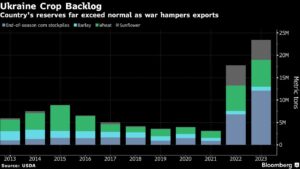President Donald Trump on Friday signed an executive order temporarily expanding the amount of beef the U.S. can import from Argentina, a move the White House says is aimed at…
Ten Ships Have Sailed From Ukraine Under Black Sea Export Deal, While France Endures Record Drought
New York Times writer Emma Bubola reported yesterday that, “The biggest caravan of ships carrying grain and other agricultural products since the beginning of the Russian invasion has sailed from Ukrainian ports on Sunday, heading to Europe, Asia and the Middle East through the mined waters of the Black Sea.
According to the United Nations, the four ships leaving what was one of the world’s breadbaskets carried more than 160,000 metric tons — about 176,000 U.S. tons — of agricultural products.
“Ismini Palla, a spokeswoman for the United Nations, said that the ships were carrying 6,000 metric tons of sunflower oil to Italy, 45,000 metric tons of meal to China, 66,000 metric tons of sunflower oil to Iran, and 44,000 metric tons of corn to the Turkish city of Iskenderun.”
The Times article noted that, “[Oleksandr Kubrakov, Ukraine’s infrastructure minister] said that the government was gradually moving on to enable ports to handle larger volumes of work, aiming for at least 100 vessels a month in the near future.
“Experts have said that the issues affecting food markets are far from being solved, with a food crisis that has already grown to such proportions that no single intervention can solve it.”

And Reuters News reported today that, “Two more ships, carrying corn and soybeans, departed from Ukrainian Black Sea ports on Monday, Turkey and Ukraine said, taking the total to ten since the first ship sailed last week under a deal with Russia to unblock Ukrainian grain exports.”
“The Sacura, which departed from Pivdennyi, is carrying 11,000 tonnes of soybeans to Italy, Turkey’s defence ministry said on Monday, while the Arizona, which left Chornomorsk, is carrying 48,458 tonnes of corn to Iskenderun in southern Turkey,” the Reuters article said.
The Reuters article added that, “Kubrakov had said previously the opening of Pivdennyi would push Ukraine’s total export capacity up to three million tonnes a month.
“In peacetime, Ukraine exported up to six million tonnes of grain a month from its ports on the Black Sea and Sea of Azov coast.”
Meanwhile, Bloomberg writers Aine Quinn, Ann Koh, and Vivian Iroanya reported late last week that, “Ukraine’s first shipments of grain since being invaded by Russia are a harbinger of relief for squeezed global markets, but many challenges remain before the millions of tons of food stuck in the country can be released.
“Perhaps the biggest is the willingness of shipowners to send their vessels into harm’s way, as the waters are littered with mines and Russia didn’t hesitate to strike the port of Odesa after the safe-passage agreement was signed. Officials with knowledge of the insurance market quoted a wide range of figures for covering the nation’s cargoes, with most of the numbers looking prohibitive for the trade.
“‘Insurance costs should be very high, and without any government assistance it will be difficult to find,’ said Benoit Fayaud, an analyst with Strategie Grains in France. ‘It can be an issue for exports to accelerate.'”
And in news regarding agricultural production, New York Times writer Aurelien Breeden reported late last week that, “France declared Friday that it was in the grip of its ‘most severe’ drought, one that has also desiccated large areas of Europe this summer, causing wildfires and imperiling crops as temperature records shatter across the continent.
“‘This drought is the most severe recorded in our country,’ Élisabeth Borne, the French prime minister, said in a statement on Friday.”
Reuters News reported yesterday that, “France on Sunday braced for a fourth heatwave this summer as its worst drought on record left parched villages without safe drinking water and farmers warned of a looming milk shortage in the winter.
“Prime Minister Elisabeth Borne’s office has set up a crisis team to tackle a drought that has forced scores of villages to rely on water deliveries by truck, prompted state-run utility EDF to curb nuclear power output and stressed crops.”





